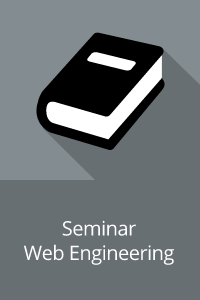
Seminar Web Engineering (WS 2019/2020)
Welcome to the homepage of the Seminar Web Engineering
This website contains all important information about the seminar, including links to available topics as well as information about the seminar process in general.
The interdisciplinary research area Web Engineering develops approaches for the methodological construction of Web-based applications and distributed systems as well as their continuous development (evolution). For instance, Web Engineering deals with the development of interoperable Web Services, the implementation of web portals using service-oriented architectures (SOA), fully accessible user interfaces or even exotic web-based applications that are voice controlled via the telephone or that are represented on TV and Radio.
The following steps are necessary to complete the seminar:
- Preparation of a presentation about the topic assigned to you.
- An additional written report of your topic.
- Each report is reviewed by two or three other particpants.
Seminar chairs


Contact
If you have any questions concerning this course or the exam as a participant, please contact us via OPAL.
We also offer a Feedback system, where you can provide anonymous feedback for a partiular session to the presenter on what you liked or where we can improve.
Participants
The seminar is offered for students of the following programmes (for pre-requisites, please refer to your study regulations):
- Bachelor Informatik (Proseminar 500110 /Hauptseminar 500070)
- Bachelor Angewandte Informatik (Proseminar 500110 / Hauptseminar 500270)
- Bachelor Informatik und Kommunikationswissenschaften (Hauptseminar 500070)
- Informatik für Sozial- und Geisteswissenschaftler (Proseminar 500110 /Forschungsseminar 500090)
- Master Informatik (Forschungsseminar M_01)
- Master Angewandte Informatik (Forschungsseminar 500090)
- Master Web Engineering (Seminar Web Engineering 500410)
If your programme is not listed here, please contact us prior to seminar registration and indicate your study programme, the version (year) of your study regulations (Prüfungsordnungsversion) and the module number (Modulnummer) to allow us to check whether we can offer the seminar for you and find an appropriate mapping.
Registration
You may only participate after registration in the Seminar Course in OPAL
The registration opens on 01.10.2019 at 12:00 and und ends on 07.10.2019 at 23:59. There is an overall capacity of 30 slots available. As these slots are usually rather quickly booked, we recommend to complete your registration early after registration opens.Topics and Advisors
Questions:
- What is WebAssembly?
- What are examplary use case scenarios?
- What is the current State of the Art regarding WebAssembly?
Questions:
- What are multi-agent systems, where are they used, how do they work, what are major implementations/frameworks?
- Report on multi-agent systems in the context of data analysis, computer vision, object detection and metrics calculation.
- What are approaches to combine results from agents solving the same problem, how to resolve conflicts, how to combine results, how to provide results from one agent as additional input to another agent?
Questions:
- How will Railways change by Smart Rail?
- What are important intermediate steps for developing a complete Smart Rail?
- Why should Smart Rail be realized?
Questions:
- No Blockchain explanation!
- What are (often forgotten) limits of Blockchain?
- What are popular use cases where Blockchain is used, even if another technology would workout in a better way?
Questions:
- Provide an introduction to DevOps covering the CALMS principles, Continous Deployment/Delivery, Container Virtualization, DevOps Metrics and Infrastructure as Code.
- Which tools exist to support DevOps?
- How far is the adoption of DevOps in Germany/World-wide based on surveys etc.?
Literature:
- https://ieeexplore.ieee.org/document/8409919
- https://katalog.bibliothek.tu-chemnitz.de/Record/0-657501743
- Docker, Kubernetes, Jenkins, Gitlab CI, Bamboo, Travis CI
Questions:
- Provide an introduction to Software Product Lines covering Domain Engineering, Variability Management, Variation Analysis and Feature Modeling.
- What are SPLE methods and tools and what are their current limitations?
- Where are SPLs used and how wide-spread is their use?
Questions:
- What is it?
- How can it be set up for research data management?
- How does it compare to DSpace?
Literature:
Questions:
- What is it?
- How can it be used?
- What are alternative approaches?
Literature:
Questions:
- What is it?
- What are online tools to check for plagiarism?
- Compare existing solutions regarding costs, effectiveness and licence models.
Questions:
- What is Gamification?
- What are current approaches in higher education?
- What are possible pros and cons?
Questions:
- What is it?
- Compare existing solutions regarding usecases, costs, licence models and used hardware (clickers vs. BYOD).
- What are risks and benefits of gamified CRS?
Questions:
- How can an ontology benefit application development for the smart transportation domain and car industry, is it really useful?
- Do big manufactures in the transport domain i.e., BWM, Audi, DB, use ontologies and how?
- What are the research challenges specific to application development on top of cars?
Literature:
- Own research
Questions:
- What are the existing solutions, provide a comprehensive classification of the different approaches?
- Compare the existing solution based on different critera
Literature:
- SurfaceSight: A New Spin on Touch, User, and Object Sensing for IoT Experiences, CHI2019
- Alternative Avenues for IoT: Designing with Non-Stereotypical Homes, CHI2019
- Design Considerations for Interactive Office Lighting, CHI2019
- Managerial Visions: Stories of Upgrading and Maintaining the Public Restroom with IoT, CHI2019
Questions:
- What are PIDs?
- Which Handle systems exist and how do they work?
- How can we build an own identifier service, e.g. to identify different real-world resources on our university?
Literature:
- Own research
Questions:
- How does it differ from DataLakes and DataWarehouses?
- What are differences between DSpace, Dataverse, Fedora and CKAN in 2019?
- How can we ingest data in such a DataHub?
Literature:
- Own research
Questions:
Literature:
Seminar Opening
If you have not done this so far, please register in the VSR Seminar Workflow System.
The slides of the seminar opening are available here.
Short Presentation
The date for the short presentations was: Monday, 18 Nov 09:00 in room 1/367.
In your short presentation, you will provide a brief overview on your selected topic.
This includes the following aspects:
- What is in your topic?
- Which literature sources did you research so far?
- What is your idea for a demonstration?
The short presentation should be no longer than 3 slides (in addition to your title slide) and take max. 5 minutes. Following your short presentations, the advisors will provide you with feedback and hints for your full presentations.
Hints for your Presentation
- As rule of thumb you can plan for 2 minutes per slide. Significantly more slides per minute can be difficult to perceive for the audience.
- Prior to creating your presentation, you should think about: What should be the main message of my presentation? What should the audience remember after my presentation?
Based on these considerations you should create your presentation. - Here you can find some useful hints http://www.garrreynolds.com/Presentation/
Seminar Days
The seminar days will take place on
Monday, 16/12/2019 09:00 - 15:00 in 1/367A
Thursday, 19/12/2019 13:30 - 20:30 in 1/367
- Proseminar: 25 min + 5 min questions
- Hauptseminar: 30 min + 5 min questions
- Forschungsseminar: 30 min + 5 min questions
- WE-seminar (group of two): 40 min + 5 min questions
- WE-seminar (solo): 30 min + 5 min questions
Report
- Important hints on citing:
- Any statement which does neither belong to general knowledge nor stem from the author has to be provided with a reference to its original source.
- "When to Cite Sources"- Good overview by Princeton University
- Examples for citations can be found in the IEEE Citation Reference
- Web References have to be cited with author, title, date, URL and date of last access. Examples:
- [...] M. Nottingham and R. Sayre, "The Atom Syndication Format - Request for Comments: 4287", 2005. [Online]. Available: http://www.ietf.org/rfc/rfc4287.txt. [Accessed: Feb. 18, 2008].
- [...] Microsoft, "Microsoft Office SharePoint Server 2007 Homepage", 2007. [Online]. Available: http://office.microsoft.com/en-us/sharepointserver/. [Accessed: Jan. 02, 2007].
- The url has to be included as a hyperlink ("clickable") if technically possible.
- Further Information and Hints:
- Please use, as far as possible, the HTML elements which are used in the template. Changes to the CSS file are not allowed and will be ignored.
- Carefully check spelling and grammar of your reports, preferably using software support such as OpenOffice, Microsoft Word or LanguateTool, before uploading it.
- Check that your HTML is valid using the W3C Validator
Review
- Each seminar participant has to review exactly three reports. The reviews are not anonymous.
- Use the review forms provided in the VSR Seminar Workflow, one per report.
- Following the review phase, each seminar participant will receive the three peer reviews of his report and, if necessary, additional comments by the advisors. You will then have one more week to improve your report according to this feedback.
- The seminar grade will consider the final report.
All comments in the reviews are for improving the text and therefore in the interest of the author.


